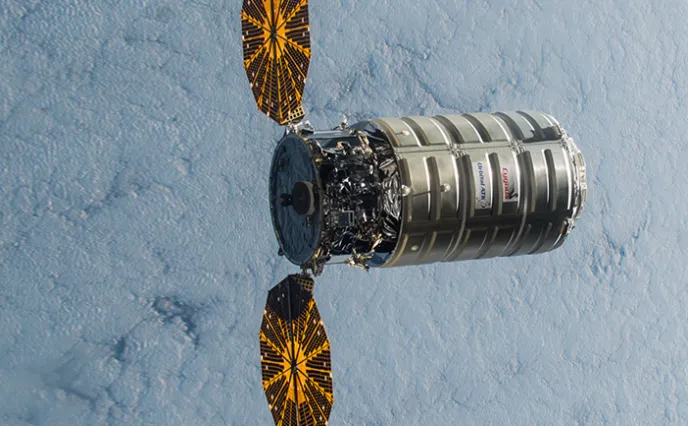The enhanced Pressurized Cargo Module (PCM) developed by Thales Alenia Space delivers 3,500 kg of cargo in a total volume of 27 cubic meters.
Cannes, February 15, 2020 – The Cygnus spacecraft, dedicated to deliver supplies to the International Space Station (ISS), has been successfully launched by an Antares rocket from Wallops Island, Virginia. Cygnus comprises two main sections: a Service Module from Northrop Grumman, and an enhanced Pressurized Cargo Module (PCM) developed and built by Thales Alenia Space, a joint venture between Thales (67%) and Leonardo (33%). This is the 13th operational mission from Cygnus.
The Cygnus resupply vehicle is a lifeline for astronauts on the International Space Station since 2013, designed to transport the precious cargo that enables the work and life on the ISS, including oxygen, water, scientific experiments, crew supplies, and spare parts. Since end of 2015, the enhanced configuration features a more efficient design able to accommodate more payload weight (over 3,500 kg) and volume.
Life in space and Space for Life

The newly launched cargo carries the Mobile SpaceLab, a tissue and cell culturing facility, Plant Habitat-02, which will cultivate radishes in the Advanced Plant Habitat facility as a model plant that is nutritious and edible. It also carries the Spacecraft Fire Experiment-IV (Saffire-IV) investigation, which will use the Cygnus resupply vehicle after it leaves the space station to examine the development of a fire in different materials and environmental conditions. This latest experiment is vital for developing flame-resistant materials and fire prevention measures.
Although fascinating, Space is a very hostile environment. Humankind urges to explore it, trying to push the boundaries of our scientific and technical knowledge. Learning from Space and understanding its environment is a good way to improve our existence on Earth and in Space. Human space exploration allowed us to improve technology and expand new industries, and here lies the vital importance of Cygnus. By enabling astronauts to receive all the required supplies and equipment, they can live and work properly, far away from home, and therefore complete their major mission. The missions, handled by astronauts in cooperation with space agencies, laboratories, industries and scientific organizations, definitely contribute to improve life on Earth, anticipating as well major milestones regarding space exploration or human exploration of Mars.
Cygnus: a 10-year success story with Northrop Grumman
Thales Alenia Space has supplied cargo modules to Northrop Grumman since the start of the Cygnus program. The first contract in 2009 was for the delivery of nine modules, while a second contract in 2016 added nine more. Thirteen operational PCMs plus a demo module have been launched to date, four in the original version and ten in the enhanced version. Thales Alenia Space has supplied over 50% of the Internal Space Station’s pressurized volume, including Nodes 2 and 3, the Multipurpose Module (MMP), Multipurpose Logistics Modules (MPLM), Cupola, Columbus lab structure, the pressurized cargo module for ATV resupply vessels and the structure for the Bishop commercial airlock from NanoRacks.
Pioneering the future of space exploration

This launch further confirms Thales Alenia Space’s ongoing contribution to the success of Cygnus cargo missions and its ability to support future space exploration missions, bringing its expertise to expand the frontiers of knowledge. Capitalizing on its expertise regarding orbital infrastructures and thanks to the work being done on innovative solutions, including reusable space transport vehicles. Thales Alenia Space designs the future of space exploration.
Photos & artistic views: ©NASA - ©Northrop Grumman & ©Thales Alenia Space/Master Image Programmes
ABOUT THALES ALENIA SPACE
Drawing on over 40 years of experience and a unique combination of skills, expertise and cultures, Thales Alenia Space delivers cost-effective solutions for telecommunications, navigation, Earth observation, environmental management, exploration, science and orbital infrastructures. Governments and private industry alike count on Thales Alenia Space to design satellite-based systems that provide anytime, anywhere connections and positioning, monitor our planet, enhance management of its resources, and explore our Solar System and beyond. Thales Alenia Space sees space as a new horizon, helping to build a better, more sustainable life on Earth. A joint venture between Thales (67%) and Leonardo (33%), Thales Alenia Space also teams up with Telespazio to form the parent companies’ Space Alliance, which offers a complete range of services. Thales Alenia Space posted consolidated revenues of 2.5 billion euros in 2018 and has 8,000 employees in nine countries. www.thalesaleniaspace.com
THALES ALENIA SPACE – PRESS CONTACTS
Sandrine Bielecki
Tel: +33 (0)4 92 92 70 94
sandrine.bielecki@thalesaleniaspace.com
Marija Kovac
Tel: +39 06 41512685
marija.kovac-somministrato@thalesaleniaspace.com
Tarik Lahlou
Tel : +33 (0)5 34 35 35 67
tarik.lahlou@thalesaleniaspace.com


